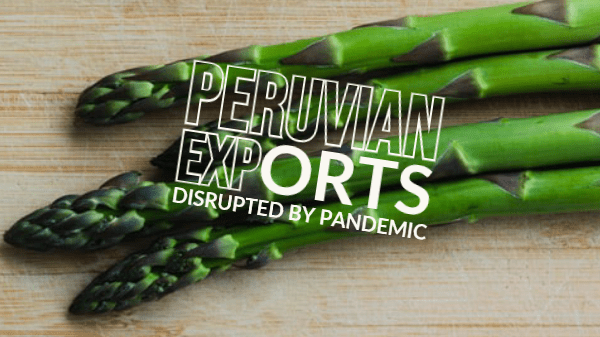Peruvian asparagus was down the first half of 2020, and not surprisingly, it’s due to the pandemic.
But COVID-19 regulations on labor are a bigger factor than any other pandemic effects.
Lionel Are Orbegozo, the general manager of Complejo Agroindustrial Beta, said that from January to July 2020, Peru produced between 10 to 15 percent less asparagus in comparison to the same time frame last year, while asparagus exports fell by 15 percent due to COVID-19 and the resulting quarantine established by the government, as reported by Agraria.
Arce said the restriction on international commercial flights were not what affected the industry the most, but instead it was the cost increase of labor and local transportation.


For Complejo Agroindustrial Beta, who exports half of Peru’s frozen asparagus, the cost of production increased by up to 30 percent, primarily due to actions and protocols that companies set in place in order to avoid the spread of COVID-19.
While Arce hopes the asparagus business will reactivate in the second semester of this year, he mentions that in order to boost the sector and make Peruvian asparagus more competitive, it essential that the National Agrarian Health Services (Senasa) resume field and packing certifications and also negotiate with the Animal and Plant Health Inspection Service of the United States Department of Agriculture (APHIS-USDA) to find a better export conditions for asparagus.
“We have more and more pressure from the destination countries regarding the type of control we have,” he said.
“Australia has us paralyzed, Japan has us very checked, Europe made us a phytosanitary inspection on asparagus, which it had not done in 30 years of exporting this vegetable. Now we have to go to Europe with a filter and in the United States we have a fumigation that It takes us out of competitiveness in relation to Mexico. We have to work on that, especially now that asparagus shipments from Peru to the United States have become more maritime, which added to the fumigation does not help us.”
He added that currently asparagus is produced by small farmers and has to be protected, as the large agro-industrial operations asparagus have been replaced by other crops.
“Certification (in the field and packing) is vital to export to any destination, and we seek that asparagus is also included so that it has an integrated management and thus improve phytosanitary conditions,” Arce said. “That is something that has to be regulated anyway.”



